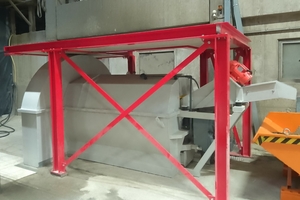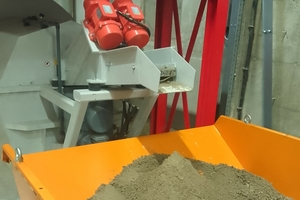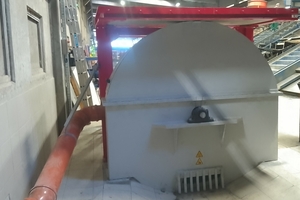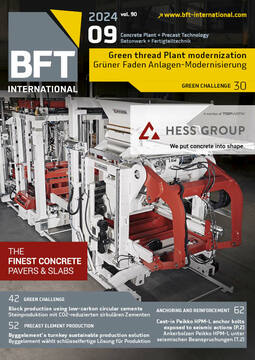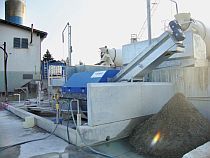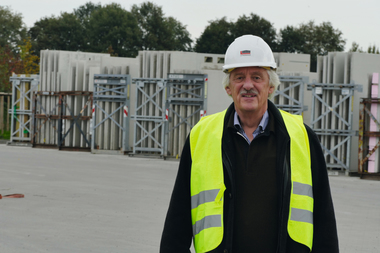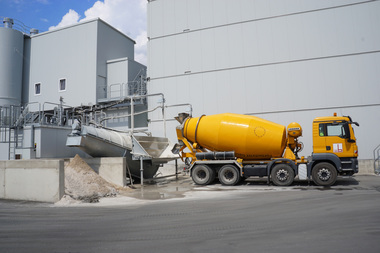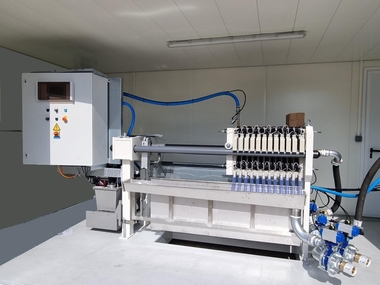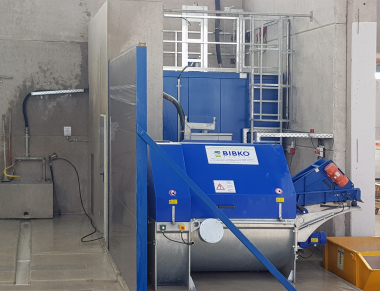New Geco concrete wash-out plant enhances sustainability
When it comes to sustainability, the company B. Lütkenhaus GmbH from Dülmen in Germany is at the very forefront. For the owner and Managing Director Ulrich Lütkenhaus, orienting his company toward sustainability has been a major objective already for many years. One specific example of this is the Gold Certificate the CSC awarded the company Lütkenhaus in May 2023. The Concrete Sustainability Council (CSC) is a global certification system that confirms a company’s practiced ecological, social and economic responsibility in the concrete, cement and aggregates sectors. Another building block for many products is the EDP - Environmental Product Declaration. Reduction of CO2 is also a major topic that has been implemented by Holcim Germany for many years by the use of CO2-reduced cements.
In November 2023, Lütkenhaus decided on a Flotmat-04-K from the company Geco Recycling GmbH in Ketsch, Germany, for the existing mixing plant in the precast plant (Fig. 1). The purpose was to enhance the washing process for the mobile concrete buckets and the bucket conveyor. This quite practical aspect of sustainability will likewise be implemented.
The Flotmat concrete wash-out plant can process both fresh residual concrete and the wash water resulting from cleaning the mixing plant. This is achieved by separating sand and aggregate – the so-called washed gravel mix – from the residual water. The residual water still contains fine particles: i.e., cement and ultrafine particles. Both components – the gravel mix and the residual water – can be reused for concrete production. In the wash trough, the residual concrete is conveyed to the discharge side by the slowly rotating paddles and is segregated in this process.
Simultaneously, the counter-current in the existing water is directed to the other side so that the floating fine particles are washed out and discharged. The unique multistage cleaning process enables reclamation of the gravel mix, optimally washed out in two separate washing chambers (separation cut at approx. 0.2 mm). The patented construction of the Flotmat series ensures high wash-out performance with minimum wear. Owing to system design, energy consumption is very low, which is an important factor today in the choice of production machines.
The vibrating conveyor, used here instead of discharge screws, is one of the factors enabling low energy consumption – which also contributes to low maintenance costs. The ascending vibrating dewatering conveyor is fitted with a special slotted plastic screen on which the gravel mix is discharged from the Flotmat. During the discharge process, the material is intensively drained. The separated water runs back into the Flotmat (Fig. 2).
The versatility of the Flotmat is significantly increased by a bucket wheel. In addition to filling from above or sideways over the table, the material to be washed can be picked up with the bucket wheel at ground level. This arrangement at this level greatly facilitates cleaning of the concrete buckets and small appliances of all kinds. Residual concrete and wash water are picked up below ground level and scooped into the washer (Fig. 3).
The complete control system is installed in a standard control cabinet. A touch panel installed in the door of the control cabinet displays the various operating states of the plant. On the keypad, the variables (e.g., interval times) have been preset by the plant and can be adjusted by the operator on site. Conversion from automatic-interval permanent operation to manual operation enables direct access to individual plant components. An acoustic or optical alarm signals a malfunction in the plant and/or a maintenance interval that is due, which is shown in plain text on the display. Integration into the control of the mixing plant is also possible.
With the decision for the new concrete wash-out Flotmat-04-K, the Managing Director Ulrich Lütkenhaus demonstrates that the topic of climate protection in all its facets is important to him. “Sustainability in the form of environmentally friendly products and solutions is becoming increasingly important for tendering bodies, clients and developers.”
With this new recycling plant, B. Lütkenhaus GmbH from Dülmen proves that it is not only one of the most efficient and innovative concrete and precast plants in Germany, but also one of the most sustainable.

